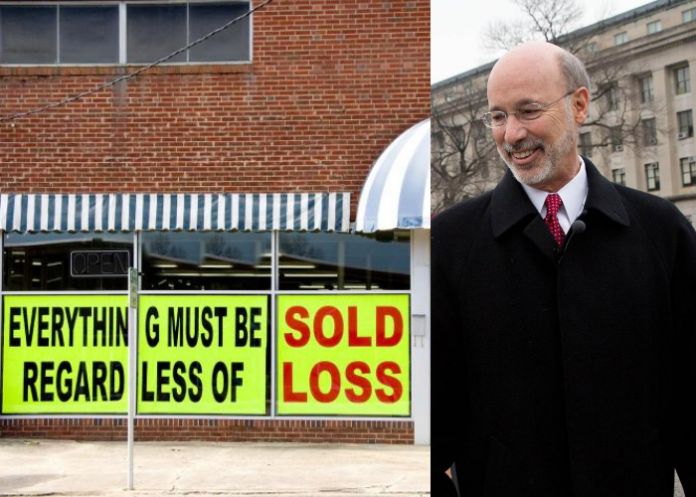A bill to block Gov. Tom Wolf from unilaterally entering Pennsylvania into the Regional Greenhouse Gas Initiative (RGGI) passed the state House of Representatives and awaits action in the state Senate.
RGGI, established in 2009, is an interstate cap-and-trade program made up of the New England states, along with Delaware, Maryland, New Jersey, New York, and Virginia. Cap-and-trade programs limit carbon-dioxide emissions by establishing a specific maximum amount of carbon dioxide businesses or other organizations may produce and allowing them to purchase additional capacity from other entities that have not used their full production allowance. If an entity emits above the cap without purchasing additional allowances, it will suffer a financial penalty. RGGI requires power plants larger than 25 megawatts in capacity to purchase emissions allowances at auction for each ton of carbon-dioxide emissions they produce. There are a limited number of allowances issued, and they are gradually reduced each year.
Governor’s Unilateral Climate Action
Wolf signed an executive order in 2019 directing the state’s Department of Environmental Protection (DEP) to align commonwealth regulations with RGGI with a goal of joining the program by 2022.
H.B. 2025 “clarifies that the Department of Environmental Protection (DEP) does not have authority to join the Regional Greenhouse Gas Initiative … or similar state or regional greenhouse gas cap-and-trade programs unless authorized by the General Assembly,” according to the bill’s text.
One-hundred-and-thirty legislators voted in favor of H.B. 2025 on July 8, with 71 voting against it. Wolf declared he would veto the bill if it passes the Senate.
Pennsylvanians, through the legislature, should have a say concerning whether Pennsylvania joins RGGI, says the bill’s sponsor, Rep. Jim Struzzi (R-Indiana).
“Decisions to address climate change should not be done unilaterally by the governor,” told reporters.
High Costs, Limited Benefits
Critics of RGGI say research shows it has failed to reduce greenhouse gas emissions but has raised energy costs across the region, something they argue will be true for Pennsylavia if it joins RGGI.
Seven of the nine RGGI states are in the top 10 in the continental United States for highest electricity prices. As RGGI states have added more renewable power to their grids to replace fossil-fuel-generated electricity, their energy prices have risen, faster than in other states.
Evidence suggests RGGI membership would hit Pennsylvania’s economy especially hard because Pennsylvania is a major producer of natural gas and still has a vibrant (if somewhat diminished) coal sector, unlike other RGGI states. With RGGI targeting emissions from fossil fuels, Pennsylvania would bear a heavier regulatory burden than the other, less-industrialized RGGI states.
The Industrial Energy Consumers of Pennsylvania (IECP) estimates the “minimal financial impact of signing on to RGGI for [Pennsylvania] would be approximately … $275 million per year additional cost to electric generators.” IECP concluded the “impact to electricity prices and energy intensive manufacturing should be studied and fully understood before moving forward with RGGI.”
A separate analysis by David T. Stevenson, director of the Caesar Rodney Institute, found RGGI’s current auction prices for carbon dioxide allowances would raise electricity prices in the commonwealth by $412 million annually, or roughly $90 per Pennsylvania household. Projected increases in auction prices could raise this to $1.2 billion annually.
A 2018 Cato Institute Working Paper found “no added reductions in CO2 emissions, or associated health benefits from the RGGI program.”
‘Flawed Proposal’
Wolf’s action to force Pennsylvania to join RGGI will harm the state’s residents and the business environment while doing nothing to protect the environment, testified Carl A. Marrara, vice president of Governmental Affairs for the Pennsylvania Manufacturers’ Association, at a meeting of the Pennsylvania Senate Environmental Resources and Energy Committee on June 23.
“RGGI is a flawed proposal and is not sound public policy,” Marrara said. “The issue at hand is whether or not a government program, that will undoubtedly add substantial costs to Pennsylvania’s electricity consumers, is the best mechanism to achieve the cleanest, healthiest, and most sustainable environment possible?
“The answer to this question is clearly that RGGI does not accomplish this goal, but will negatively impact Pennsylvania’s economy in a punishing way,” Marrara testified.
Tim Benson (tbenson@heartland.org) is a policy analyst at The Heartland Institute.
Internet Info
Lindsey Stroud, “Research & Commentary: Gov. Wolf’s Unilateral Move to Join RGGI Is Regressive, Will Increase Energy Prices in Pennsylvania,” The Heartland Institute, November 21, 2019: https://www.heartland.org/publications-resources/publications/research–commentary-gov-wolfs-unilateral-move-to-join-rggi-is-regressive-will-increase-energy-prices-in-pennsylvania
Official Connections:
Gov. Tom Wolf: https://www.governor.pa.gov/; https://www.governor.pa.gov/contact/
Pennsylvania state Jim Struzzi (R-Indiana): http://www.repstruzzi.com/; http://www.repstruzzi.com/contact


























